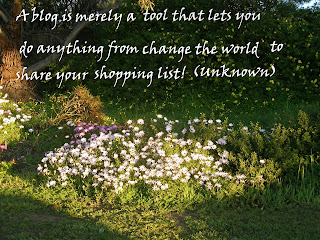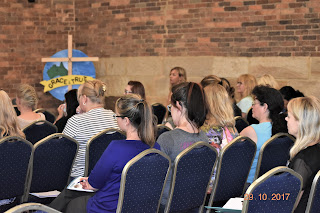The people read it and were glad for its encouraging message. Acts 15:31 (NIV)
'Why do you write?'
I love words. Writing allows time to choose and shape my words without interruption. I love telling stories - anecdotes, family legends, funny happenings. I love making up stirring tales about heroes and heroines, strange lands and epic adventures. I love to teach, to impart shared wisdom, acquired knowledge. I love the way poetry encapsulates emotion and beauty and wonder. Writing helps me process my thoughts, to discover meaning - to understand myself, to commune with God and to communicate with others. Writing is a calling though it can never take the place of a living relationship my Lord.
There are a multitude of reasons to write. I think most writers write because they love writing, because they have something to say, stories to tell. Those that write for fame or fortune are surely soon disillusioned.
Why do you write?
And who do you write for?
Do you write for yourself? For an audience of One? For your family or friends? Or for strangers? Perhaps, for those who haven't yet been born?
Or, to ask it another way. Why is it important to you to be published?
The reasons for writing and the reasons for (wanting/seeking/being) published are perhaps different. Maybe, we write because we must, it's a passion or a necessity. But, we seek publication so that our words and stories will be read - not just by us, or a select group of friends and family - but by those we don't know and may never meet.
Words Unread
Words are powerful. Yet, unread words wait in silence, wait to uncoil and be unleashed in the mind of the reader.
Of course, as many have reminded us - we can't choose the impact of our words or the size of our audience. God is the God of the harvest and He directs the workers. Paul say (1 Cor), one sows, another waters. We write - as well as live - by faith and by God's grace. This is true whether we write Christian fiction or for the general market, if we write to shine a light or to entertain, to challenge (or all of the above).
At no time is our worth or our standing with God predicated on the state of our manuscript or our publication status or the size of our social following.
There is a balance - between resting in and on God and doing the good He has planned for us. Grace is not an excuse to be idle when we could be working, though there are fallow seasons, there are times when God calls us into the wilderness, times when He passes the mantle onto others - and then there are times of planting and harvest.
For me, and probably for you, writing is also about finding and connecting with readers - not only my friends and family, and not only other writers (though I love you all and I appreciate everyone who buys and reads (and reviews ;) ) my books and the books of other writers). I think its wonderful and necessary that we support each other - but just as the Church needs to extend into the workday week and connect with the community beyond her doors to be effective, we also need connect with general readers.

Here are some of ideas how we do this - not in any particular order or importance:
- Readers in our existing networks - family, friends, work colleagues etc.
- Being an expert or at least interesting in a related subject
- Social media - being interactive not pushy
- Blogging
- Readers groups and book clubs
- Reviews, reviews, reviews
- Cross-promotions with other authors
- Blog tours, interviews, character cameos
- Anthologies and book bundles
- Newsletters and events
- Launches
- Book signings & bookshop events
- Author talks, School & Library visits
- Study notes
- Different formats
- Donating books
- Promotions and ads
- Quirky promotions
- Leaving books in mystery locations
- Markets
- Conventions and Book Fairs
- Begging (joking, don't beg, pray instead)
Not that we can necessarily do it all and certainly not all of the time. We do what we can - and rest in the Lord of the Harvest.
What ideas or experiences of connecting with readers have you had?
New International Version (NIV)
Holy Bible, New International Version®, NIV® Copyright ©1973, 1978, 1984, 2011 by Biblica, Inc.® Used by permission. All rights reserved worldwide.
----
Jeanette started spinning tales in the world of Nardva at the age of eight or nine. She enjoys writing secondary world fiction, poetry, blogging and editing. Her Nardvan stories span continents, time and cultures. They involve a mixture of courtly intrigue, adventure, romance and/or shapeshifters and magic users.She has published stories and poems in over a dozen anthologies, including Glimpses of Light, Futurevision, Tales From the Underground, and Quantum Soul. She recently released her debut novel Akrad's Children - the first in the Akrad's Legacy series.
Find her at her Facebook Page or at Goodreads or on Amazon or on her websites JennysThread.com or Jeanette O'Hagan Writes . if you want to stay up-to-date with latest publications and developments, sign up to Jeanette O'Hagan Writes e-mail newsletter.






































